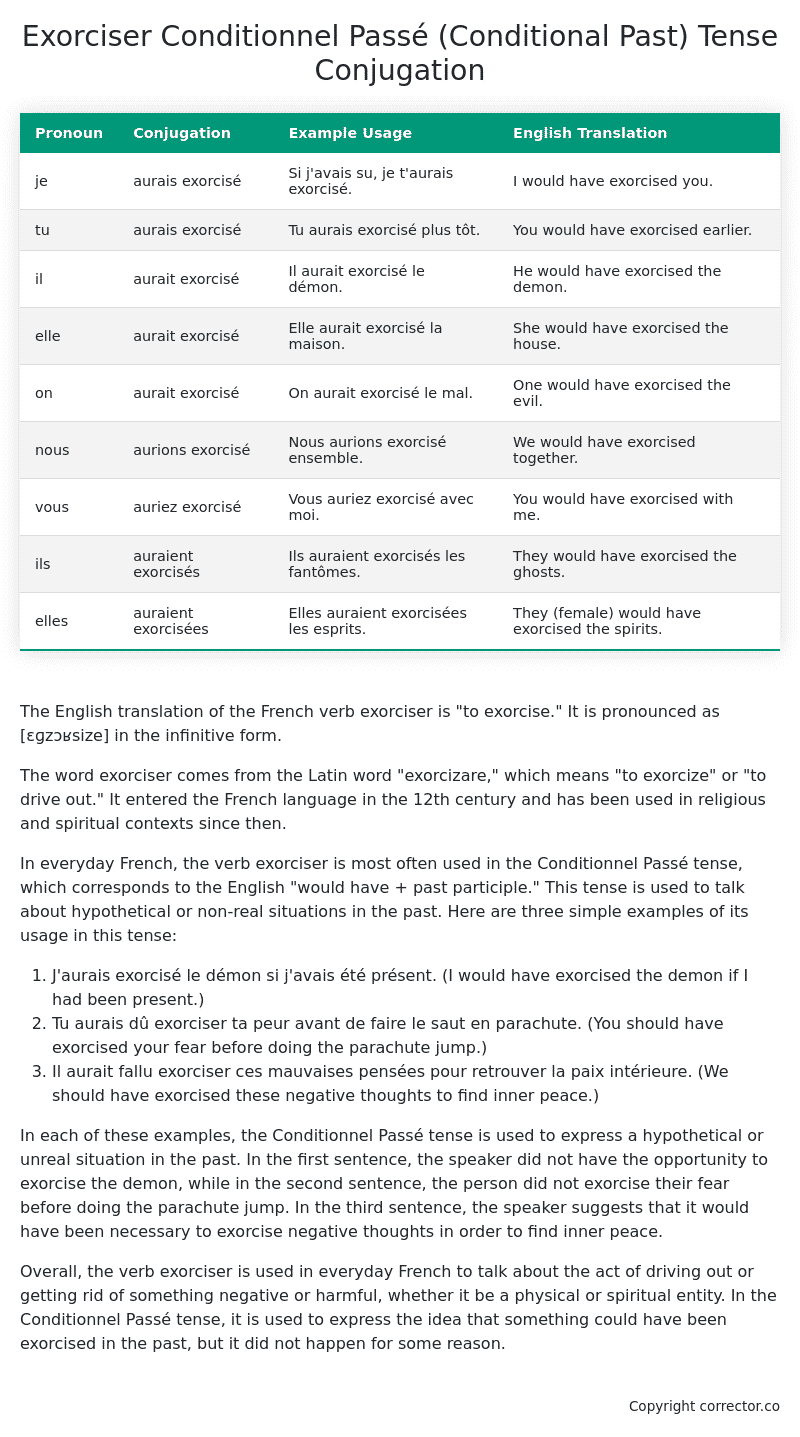Conditionnel Passé (Conditional Past) Tense Conjugation of the French Verb exorciser
Introduction to the verb exorciser
The English translation of the French verb exorciser is “to exorcise.” It is pronounced as [ɛɡzɔʁsize] in the infinitive form.
The word exorciser comes from the Latin word “exorcizare,” which means “to exorcize” or “to drive out.” It entered the French language in the 12th century and has been used in religious and spiritual contexts since then.
In everyday French, the verb exorciser is most often used in the Conditionnel Passé tense, which corresponds to the English “would have + past participle.” This tense is used to talk about hypothetical or non-real situations in the past. Here are three simple examples of its usage in this tense:
- J’aurais exorcisé le démon si j’avais été présent. (I would have exorcised the demon if I had been present.)
- Tu aurais dû exorciser ta peur avant de faire le saut en parachute. (You should have exorcised your fear before doing the parachute jump.)
- Il aurait fallu exorciser ces mauvaises pensées pour retrouver la paix intérieure. (We should have exorcised these negative thoughts to find inner peace.)
In each of these examples, the Conditionnel Passé tense is used to express a hypothetical or unreal situation in the past. In the first sentence, the speaker did not have the opportunity to exorcise the demon, while in the second sentence, the person did not exorcise their fear before doing the parachute jump. In the third sentence, the speaker suggests that it would have been necessary to exorcise negative thoughts in order to find inner peace.
Overall, the verb exorciser is used in everyday French to talk about the act of driving out or getting rid of something negative or harmful, whether it be a physical or spiritual entity. In the Conditionnel Passé tense, it is used to express the idea that something could have been exorcised in the past, but it did not happen for some reason.
Table of the Conditionnel Passé (Conditional Past) Tense Conjugation of exorciser
| Pronoun | Conjugation | Example Usage | English Translation |
|---|---|---|---|
| je | aurais exorcisé | Si j’avais su, je t’aurais exorcisé. | I would have exorcised you. |
| tu | aurais exorcisé | Tu aurais exorcisé plus tôt. | You would have exorcised earlier. |
| il | aurait exorcisé | Il aurait exorcisé le démon. | He would have exorcised the demon. |
| elle | aurait exorcisé | Elle aurait exorcisé la maison. | She would have exorcised the house. |
| on | aurait exorcisé | On aurait exorcisé le mal. | One would have exorcised the evil. |
| nous | aurions exorcisé | Nous aurions exorcisé ensemble. | We would have exorcised together. |
| vous | auriez exorcisé | Vous auriez exorcisé avec moi. | You would have exorcised with me. |
| ils | auraient exorcisés | Ils auraient exorcisés les fantômes. | They would have exorcised the ghosts. |
| elles | auraient exorcisées | Elles auraient exorcisées les esprits. | They (female) would have exorcised the spirits. |
Other Conjugations for Exorciser.
Le Present (Present Tense) Conjugation of the French Verb exorciser
Imparfait (Imperfect) Tense Conjugation of the French Verb exorciser
Passé Simple (Simple Past) Tense Conjugation of the French Verb exorciser
Passé Composé (Present Perfect) Tense Conjugation of the French Verb exorciser
Futur Simple (Simple Future) Tense Conjugation of the French Verb exorciser
Futur Proche (Near Future) Tense Conjugation of the French Verb exorciser
Plus-que-parfait (Pluperfect) Tense Conjugation of the French Verb exorciser
Passé Antérieur (Past Anterior) Tense Conjugation of the French Verb exorciser
Futur Antérieur (Future Anterior) Tense Conjugation of the French Verb exorciser
Subjonctif Présent (Subjunctive Present) Tense Conjugation of the French Verb exorciser
Subjonctif Passé (Subjunctive Past) Tense Conjugation of the French Verb exorciser
Subjonctif Imparfait (Subjunctive Imperfect) Tense Conjugation of the French Verb exorciser
Subjonctif Plus-que-parfait (Subjunctive Pluperfect) Tense Conjugation of the French Verb exorciser
Conditionnel Présent (Conditional Present) Tense Conjugation of the French Verb exorciser
Conditionnel Passé (Conditional Past) Tense Conjugation of the French Verb exorciser (this article)
L’impératif Présent (Imperative Present) Tense Conjugation of the French Verb exorciser
L’infinitif Présent (Infinitive Present) Tense Conjugation of the French Verb exorciser
Struggling with French verbs or the language in general? Why not use our free French Grammar Checker – no registration required!
Get a FREE Download Study Sheet of this Conjugation 🔥
Simply right click the image below, click “save image” and get your free reference for the exorciser Conditionnel Passé tense conjugation!

Exorciser – About the French Conditionnel Passé (Conditional Past) Tense
Formation
Common Everyday Usage Patterns
Expressing Unreal Past Scenarios
Polite Requests or Suggestions
Expressing Doubt or Uncertainty
Interactions with Other Tenses
Conditional Present
Indicative Past Tenses
Conditional Future
Summary
Want More?
I hope you enjoyed this article on the verb exorciser. Still in a learning mood? Check out another TOTALLY random French verb conjugation!


